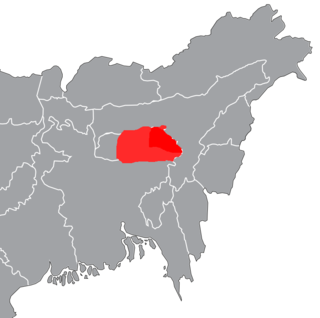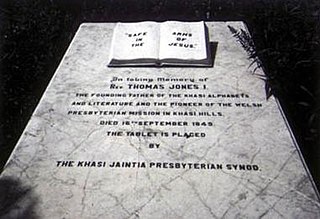
Meghalaya is a hilly state in northeastern India. The name means "the abode of clouds" in Sanskrit. The population of Meghalaya as of 2016 is estimated to be 3,211,474. Meghalaya covers an area of approximately 22,430 square kilometres, with a length to breadth ratio of about 3:1.

Khasi is an Austroasiatic language spoken primarily in Meghalaya state in India by the Khasi people. It is also spoken by a sizeable population in Assam and Bangladesh. Khasi is part of the Austroasiatic language family, and is related to Khmer, Palaung, Vietnamese and Mon languages of Southeast Asia, and the Munda and Nicobarese branches of that family, which are spoken in east–central India and in the Nicobar Islands, respectively.

Shillong is a hill station in the northeastern part of India and the capital of Meghalaya, which means "The Abode of Clouds". It is the headquarters of the East Khasi Hills district. Shillong is the 330th most populous city in India with a population of 143,229 according to the 2011 census. It is said that the rolling hills around the town reminded the British of Scotland. Hence, they would also refer to it as the "Scotland of the East".

The Khasi people are an indigenous ethnic group of Meghalaya in north-eastern India with a significant population in the bordering state of Assam, and in certain parts of Bangladesh. The Khasi people form the majority of the population of the eastern part of Meghalaya, and is the state's largest community, with around 48% of the population of Meghalaya. They are the only Mon-Khmer speaking people in India and Bangladesh, the others, the Munda are from Austroasiatic family too. A cultural tradition of the Khasi people is that they follow the matrilineal system of descent and inheritance. Under the Constitution of India, the Khasis have been granted the status of Scheduled Tribe.

Ri Bhoi is an administrative district in the state of Meghalaya in India. The district headquarters are located at Nongpoh. The district occupies an area of 2378 km² and has a population of 258,840. As of 2011 it is the second least populous district of Meghalaya, after South Garo Hills.

West Khasi Hills is an administrative district in the state of Meghalaya in India.

The Khasi Hills is a low mountain formation on the Shillong Plateau in Meghalaya state of India. The Khasi Hills are part of the Garo-Khasi-Jaintia range and connects with the Purvanchal Range and larger Patkai Range further east. Khasi Hills, and the whole Garo-Khasi-Jaintia range, are in the so-called Meghalaya subtropical forests ecoregion.
The Pnar, also known as Jaiñtia, are a sub-tribal group of the Khasi Tribe in Meghalaya, India. The Pnar people are matrilineal. They speak the Pnar Language which belongs to the Austro-Asiatic language family and is very similar to the Khasi Language. The Pnar people are natives of West Jaintia Hills and East Jaintia Hills District of Meghalaya, India. They call themselves as "Ki Khun Hynñiew Trep". Their main festivals are Behdeinkhlam, Chad Sukra, Chad Pastieh and Laho Dance.

Thomas Jones was a Welsh Christian missionary, who worked among the Khasi people of Meghalaya and Assam in India and of Bangladesh. He recorded the Khasi language in Roman script, and the inscription on his gravestone calls him "The founding father of the Khasi alphabets and literature".
Biate is a language spoken in the north-eastern part of India. The speakers of the language are known as Biate and are spread over many parts of North east India viz. Meghalaya, Assam, Mizoram, Manipur and Tripura. Biate is pronounced as Bia-te (the e in te pronounced as "a".
Williamson Ampang Sangma, a Garo leader, was the founder Chief Minister of Meghalaya, twenty-first state of India on 21 January 1972. He was also the first ever Governor of Mizoram among the Garos in 1989.
Conversion from indigenous to Christianity began in the 19th century under the British era. In the 1830s, American Baptist Foreign Missionary Society had become active in Northeast to convert indigenous tribes to Christianity. Later, they were offered to expand and reach into Cherrapunji Meghalaya, but they lacked the resources to do so and declined. Welsh Presbyterian Mission took the offer and they began work at the Cherrapunji mission field. By the early 1900s, other Protestant denominations of Christianity were active in Meghalaya. The outbreak of World Wars forced the preachers to return home to Europe and America. It is during this period that Catholicism took root in Meghalaya and neighbouring region. In the 20th century, Union Christian College started operations at Barapani, Shillong. Currently, Presbyterians and Catholics are two most common Christian denominations found in Meghalaya.
The Indian state of Meghalaya has a literacy rate of 62.56, according to the census of 2001, and is India's 27th most literate state. This, however, had rapidly increased to 75.5 by 2011.
Dkhar, alternatively spelled as Dikhar, is a term used by the Khasis to refer to non-Khasi people in Meghalaya. It is a term used for people from mainland India who come to Meghalaya Shillong to earn a living. It is a general term use to generalise all non tribals who are occupying meghalaya. It is non derogatory but some perceived it as derogatory. For Khasis any non tribal is a dkhar and they address them by that term.. According to former Director General of CAG India Govind Bhattacharjee, the term was coined by Khasi Students Union. In real terms, the word mean the affluent, educated settler from West Bengal or the Hindu, Bengali-speaking "East Bengal" man who made Assam or Meghalaya his home 50 years or even 100 years ago. The term is a Khasi word which means a foreigner. It is sometimes abbreviated to Khar.
Bertha Gyndykes Dkhar is a visually impaired Indian educationist, best known as the inventor of the braille code in Khasi. The Government of India honored her in 2010, with the third highest civilian award of Padma Shri.
Silverine Swer (1910–2014), popularly known as Kong Sil, was an Indian social and environmental activist, educationist and civil servant. She was the first person of tribal origin to hold senior posts with the Government of Meghalaya, and was a recipient of the Silver Elephant Medal of the Bharat Scouts and Guides Award and Kaisar-i-Hind Medal. The Government of India awarded her the fourth highest civilian award of Padma Shri in 1990, making her the first recipient of the award from the state of Meghalaya.
Hamlet Bareh Ngapkynta was an Indian writer, historian and film director from the Northeast Indian state of Meghalaya. He is known as the first person from the Khasi tribe, an indigenous ethic group of the state, to secure a doctoral degree (PhD) and as the maker of the first feature film in Khasi language, Ka Synjuk Ri ki Laiphew Syiem. He was the chairman of the executive committee of the Rajiv Gandhi University, Arunachal Pradesh and a recipient of the 2004 Meghalaya Day Award. The Government of India awarded him the fourth highest civilian honour of the Padma Shri in 2004,

Multiple tribes in the state of Meghalaya in northeast India practise matrilineal descent. Often referred to as Khasi people and Garo people, among the Khasi people which is a term used as a blanket term for various subgroups in Meghalaya who have distinguishing languages, rites, ceremonies, and habits, but share an ethnic identity as Ki Hynniew Trep whereas the Garo people refers to the various groups of Achik people. The Khasi, Garo, and other subgroups have a proud heritage, including matrilineality, although it was reported in 2004 that they were losing some of their matrilineal traits. The tribes are said to belong to one of the "largest surviving matrilineal culture[s]" in the world.
The People's Democratic Front (PDF) is a regional political party in the Indian state of Meghalaya. The PDF was founded in 2017 and is led by P. N. Syiem and Auspicious L. Mawphlang.
Khasi Cinema is the term used to refer to the Khasi language film industry based in Shillong in Meghalaya, India. The first Khasi film, Ka Synjuk Ri ki Laiphew Syiem, directed by late Hamlet Bareh Ngapkynta, was screened in 1981. It was followed by Manik Raitong, the celebrated 1984 Khasi film directed by Ardhendu Bhattacharya. Manik Raitong is also the first Khasi film in color. After the 2000s when militancy in the state came down drastically, a market for entertainment and movies opened up. A lot of short films and telefilms started getting produced in the Khasi language. However, the production of feature films in Khasi got a major fillip after the entry of national award winning filmmakers like Pradip Kurbah into the scene.








